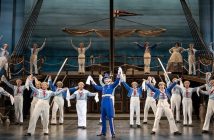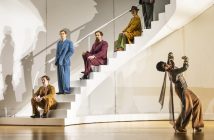“I am the proprietor of the Penguin Cafe. I will tell you things at random.” These words reverberated around the head of composer Simon Jeffes. Moments before, he had stood outside in the biting cold, staring into the windows of a dejected block of flats. The building was grey in colour, yet imposing in stature. In one window a couple were making love, but lovelessly. In another, a man surrounded by electrical equipment was making music, but with no sound or apparent enthusiasm. The last window his eyes fell upon contained a man staring vacantly into a mirror. It was as if the heart of the building had been ripped from inside it. In the corner of each room was a camera, a heedful eye watching their every movement.
It was approaching midnight. Simon turned off into a narrow sidestreet, drawn in by the sound of music and still repulsed at what he had just witnessed. He found himself in a gently lit room cloaked in sawdust, a smell that seemed to dominate the atmosphere. Inside were long communal tables, its occupants tranquil yet gregarious, their voices oozing with affable charm. Behind the tables was a band, the ensemble that had drawn him in. The intimate nature of the music was such that he remembered hearing it before, but this was not the case.
“I am the proprietor of the Penguin Cafe”, the voice repeated. The man began to establish the virtues of the cafe, advocating the importance of chance and spontaneity in everyday life. He explained how through fear, repression and a desire to be safe, the natural creativity that arises from such impulses will be lost. “Come to the Penguin Cafe where things just aren’t like that”, the figure kept assuring him.
As seductive as this scenario is, none of it actually happened. This sanctuary of creative free will and ambiguous perception, tucked away in a dystopian landscape, has never existed in solid form, however, that is unimportant. What is important is that it existed in the mind of Simon Jeffes, the founding member of The Penguin Cafe Orchestra, in the form of a hallucination. It was 1972 in the south of France; he had eaten some bad fish, leading to a severe bout of food poisoning and ultimately the aforementioned visions that played out in his head that night. Jeffes then brought these concepts to life, through music. One could say the Penguin Cafe was born, but it was already alive, for the fixtures in his dream looked somewhat stalwart.
The musical seed that was planted amongst the sawdust of the cafe that night resulted in a predominantly instrumental album laden with heart-wrenching strings and serene guitar and piano melodies. Music from the Penguin Cafe when released in 1976 was totally alien to anything else it rubbed shoulders with. Whilst the Sex Pistols were giving birth to punk and Abba were writing Dancing Queen, Simon Jeffes was locked in a room trying to elicit the sound of apathy surrounding a departing lover.
Jeffes’ persistence in his odd fusion of Antarctic and Western utopia is none more manifest than the overtly titled ‘Penguin Cafe Single’. A lapse in rationale and it could be pouring from the soul of the very orchestra present in Jeffes’ hallucination. Just as the entire album is filled with strings, this song is no different, except in its honest purpose to delight and appeal, their anthem if you like. It’s a jubilant exhibition of violin hooks and playful intent, which kicks off an album otherwise honest in its addressing of society and enchanting in resolving it.
A large portion of the album is taken up by ‘Zopf’, which consists of seven different movements. This is where the music takes on its character, providing deeply visual landscapes and scenarios that grab hold of your imagination. Despite the initial vivacity of ‘From the Colonies’ provided by Jeffes’ funky guitar upstrokes, ‘Zopf’ is the darkest element to an album of diverse mood-swings. The morbidity of ‘In a Sydney Motel’ is only intensified by the cello of Helen Leibmann and violin of Gavin Wright. ‘Surface Tension’ is driven by the haunting electric piano chords of Steve Nye who completes the quartet and – along with Jeffes – co-produced the album, a process that could only have been bolstered by the addition of a certain Brian Eno as executive producer.
‘Coronation’ contains dramatic choral vocals, by guest singer Emily Young. Vocals on the album are sparse, but Young’s disturbing yet calculatedly off-key offerings provide a spine-chilling moment at the heart of ‘Zopf’. Completing the seven movements, ‘Giles Farnaby’s Dream’ is a bright ukulele campfire song, whilst ‘Milk’ and ‘Pigtail’ are unsettlingly haphazard.
Despite being the most forthright of their song titles, the eleven minutes and forty-seven seconds of ‘The Sound of Someone You Love Who’s Going Away and it Doesn’t Matter’ is one of the most provocative pieces of music you could wish to hear. Its combination of electric piano and delicate guitar picking creates some angelic moments, the most candid of which come when the strings cease to carry the song forward and give way to the solitary sound of that blissful melody.
At this point you may begin to wonder why they didn’t end the album on such a superlative note as ‘The Sound of Someone You Love…’, which encapsulates the entire spirit of the album and somewhat concludes it. However, as the album drifts through its finale of ‘Hugebaby’ and ‘Chartered Flight’ you are soon forced to retract your thoughts. The luscious arpeggios of the former and the bleepy melodies of the album closer evoke a sense of power and self-content that have been unmatched up until that point. It’s these sentiments that most epitomize the virtues of the Penguin Cafe and ring out long after the album’s final note.
Never has the theme of an album been so well represented. In whatever circumstance you listen to it, you still get the same feelings of allure. It sounds equally poignant on a drizzly Thursday as it does on a sunny Saturday afternoon. The once imagined Penguin Cafe becomes a place of escape, a place in your head for you to drift off to, a parallel universe that you can live in as and when you please.
Such is the inspiration of the message and the metaphor, the Penguin Cafe in Jeffes’ hallucination is no more artificial than the one that lived on in his head for the rest of his life afterwards, and the way it lived on in his head was no more artificial than the fish that originally caused his hallucination. The past lives on only in our heads, as does the imagined, thus blurring the line between the two. So nearly 40 years on from Jeffes’ fateful hallucination, the Penguin Cafe lives on, as it will indefinitely.
More information about the Penguin Cafe Orchestra can be found at their website.




